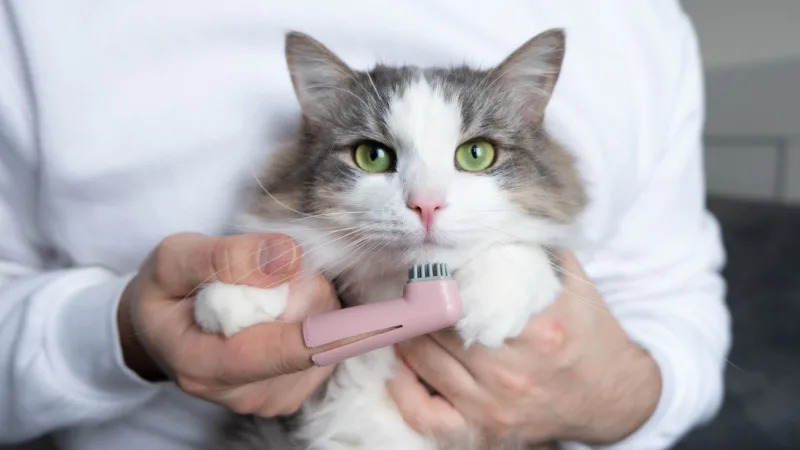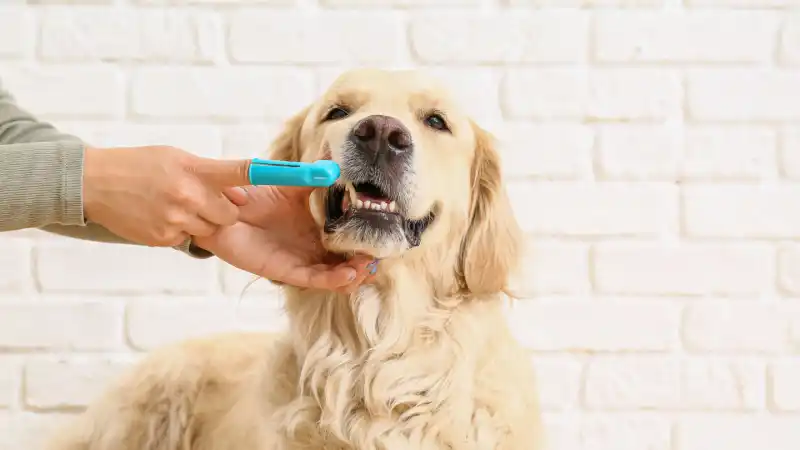Dental Disease in Dogs & Cats
Dental disease in dogs & cats can be a silent killer. Proper dental care keeps your pet healthy in more ways than one, stopping bacteria from moving to vital organs.

It’s common knowledge (and common sense) that dental disease in your dog or cat is bad for their teeth and overall oral health. We all know that rotten teeth need to be removed or that they may cause an infection in a pet’s mouth. However, what you may not know is that infection or even just bacterial overgrowth in the mouth can lead to other health complications in distant organs.
Dental disease can be a “silent killer” for pets if the bacteria from the mouth are able to spread and seed in the heart, liver, or kidneys, setting up the potential for life-threatening diseases.
How Bacteria Spreads from the Mouth to Vital Organs
The technical term for dental disease is “periodontal” disease, because this word refers to the teeth and the supporting tissues associated with them, including the gums and surrounding bone. All pets, like people, are susceptible to bacterial plaque accumulation on their teeth. If this plaque is not removed, it can cause inflammation of the gums (gingivitis), periodontitis (inflammation of the tooth and associated bone), or infection (abscess). If the bacteria enter the bloodstream, which is more common when inflammation and infection are present, they can travel to distant organs. The heart, liver, and kidneys are most susceptible and commonly affected.

Every Dog and Cat Deserves the Pet Insurance of Champions
Get prize-winning care for your pets.
The Result of Bacteria Seeding in Distant Organs
If the bacteria reach the heart, liver, or kidneys, they may cause inflammation or infection in those organs. The most well-researched pattern is the spread of bacteria to the heart, resulting in inflammation of the heart valves (endocarditis). A study conducted at Purdue University by Dr. Larry Glickman found a strong correlation between periodontal disease and endocarditis, with evidence that links poor oral health to a higher risk of heart failure in dogs. Another report from the World Small Animal Veterinary Association declared that the risk of endocarditis in dogs with moderate to severe dental disease is 6 times higher than in dogs without it.
These two studies were conducted on canines, but dental disease and resulting spread to organ tissues is also a risk for cats. Senior cats commonly develop chronic kidney disease, so it is essential to minimize any negative impact on the kidneys as they age, which includes the prevention of dental disease.
The bottom line is that inflammation or infection in any one of these vital organs could be fatal or a “silent killer” if not detected early enough for treatment. In some cases, depending on the severity of damage caused by bacteria, the disease may only be managed and not cured. Thus, the best way to minimize risk of distant organ disease caused by oral bacteria is to maintain your pet’s oral health.
How to Prevent the Spread of Oral Bacteria
The basic strategy is to prevent, reduce, or remove bacterial plaque from your pet’s teeth on a regular basis. Steps can be taken at home and by your veterinarian to reduce bacterial load in the mouth and the chance of distant organ disease.
At home, you can remove tartar and plaque from your pet’s teeth by brushing their teeth and making it a routine. This can help to decrease the frequency of professional dental cleanings needed throughout your pet’s lifetime. However, even the best at-home dental prevention plan will not negate the need for professional assessment and anesthetic dental work.
Just like humans, pets need to have their teeth evaluated and addressed regularly by a health professional. For pets, that professional is your primary care veterinarian. All pets should be seen by their veterinarian at least once a year, so that their overall health, including dental health, can be assessed. After your veterinarian makes their assessment, they will go over findings and discuss the level of dental care that is appropriate for your pet, giving you the best chance to prevent the sneaky spread of bacteria to distant vital organs.
How to Know if Your Pet Is at Risk for Dental or Organ Disease
In some pets, dental disease is obvious, and you will notice signs like bad breath, brown staining or build up on their teeth, red gums, or pain. In other pets, dental disease is not so obvious, which is another reason that regular veterinary exams are so important. If your pet has any of the obvious signs, you should schedule a visit with your vet as soon as possible. Your vet will recommend lab work at the annual visit or prior to any professional dental procedure that includes anesthesia.
Lab work, including blood tests and urinalysis, is one of the main ways that veterinarians assess your pet’s internal organ health status and the possible risk for inflammation or infection in the vital organs. Imaging, such as radiographs or cardiac ultrasound, may also be recommended, especially if the veterinarian feels your pet is at risk for heart disease.
What’s Next
Make sure that you have your pet’s annual or semi-annual exams scheduled in advance or if you think your pet has periodontal disease, call your veterinarian and get them scheduled as soon as possible. You may also want to consider a pet insurance plan that includes annual wellness coverage. For example, Defender & DefenderPlus add-ons from AKC Pet Insurance (underwritten by Independence American Insurance Company) include wellness lab work and teeth cleaning*.
If you know that your pet’s teeth and gums are currently healthy, create your at-home dental care routine now. Make sure to stay on top of dental health, so that you can play an active role in preventing dental disease from becoming a “silent killer.”
*Available with DefenderPlus Coverage

Every Dog and Cat Deserves the Pet Insurance of Champions
Get prize-winning care for your pets.
Nell Ostermeier is an Integrative Veterinarian, Motivator, Lecturer, and Consultant.
READ MORE ARTICLES

